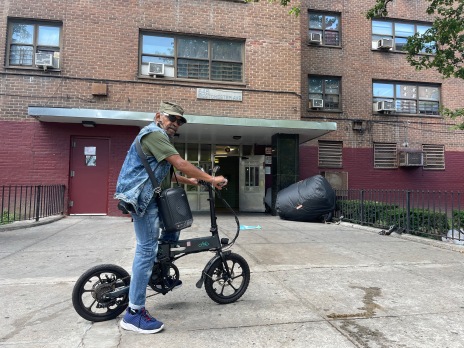The New York City Housing Authority should “limit” the number of e-bikes on its property to curb the possibility of fires caused by faulty lithium-ion batteries, the Department of Investigation said on Thursday, even as the agency definitively did not recommend that the housing authority ban the devices, as it once proposed.
Following an investigation into three infernos in 2021, including a fatal blaze that stemmed from an exploding battery in the Jacob Riis Houses in Manhattan on Dec. 16, the watchdog agency is calling on NYCHA to protect its tenants from the troubled battery packs that power many electric mobility devices, including some of the city's nearly 65,000 delivery workers.
The DOI did say that "electric/battery powered transportation pose a significant risk of fire when stored or charged in enclosed spaces," but did not call for a ban, but merely a "limit." The agency declined to quantify what that limit should be, deferring to NYCHA.
The the case of the fatal fire in the Jacob Riis Houses, the report said that the tenants were violating existing NYCHA bans on running a business out of one's unit; firefighters had spotted “several electric scooters” in the apartment, and removed 10 lithium-ion batteries. And investigation also found that the front door lock was jammed, trapping the tenants inside the apartment as the fire raged, killing one and injuring another.
The DOI listed 11 recommendations beyond the unspecified limit, included restating the ban on running a business out of a NYCHA apartment; working with the FDNY on fire-prevention strategies to allow for “safe storage and maintenance of electric modes of transportation”; and kicking off a campaign informing tenants about how to safely store such devices.
The recommendations come after NYCHA considered, and then backed down from, a contentious policy proposal that sought to bar e-bikes anywhere on its property, a move that was blasted by delivery workers and their advocates, who said it would force residents to have to choose between a job and a roof over their head.
The City Council earlier this month passed legislation banning the sale of both second-use batteries or ones that are not nationally recognized by an approved organization, such as Underwriters Laboratory. The Council is also taking up a more innovative solution for getting the dangerous batteries off city streets: a citywide “buy back” program that would allow delivery workers to swap faulty, damaged or second-hand batteries for safe, certified ones.
And just last week, Mayor Adams announced a new program to create safe, outdoor storage and charging stations on NYCHA property, in collaboration with Con Edison.
A spokesperson for NYCHA said the authority has already implemented fire safety protocols, and is working to develop more for the safety of its residents.
“NYCHA has already made revisions to its fire safety policies. The Authority has allocated funding to address the trash disposal, fire suppression, and building infrastructure issues. NYCHA is also implementing staff training, repair procedures and inspection audits, among other recommendations including developing responsible micro-mobility policies. We thank the Inspector General for carefully investigating these fires, as we are committed to improving our operations and keeping our residents safe,” said Barbara Brancaccio.
A spokesperson for the FDNY said the agency is reviewing the report.






